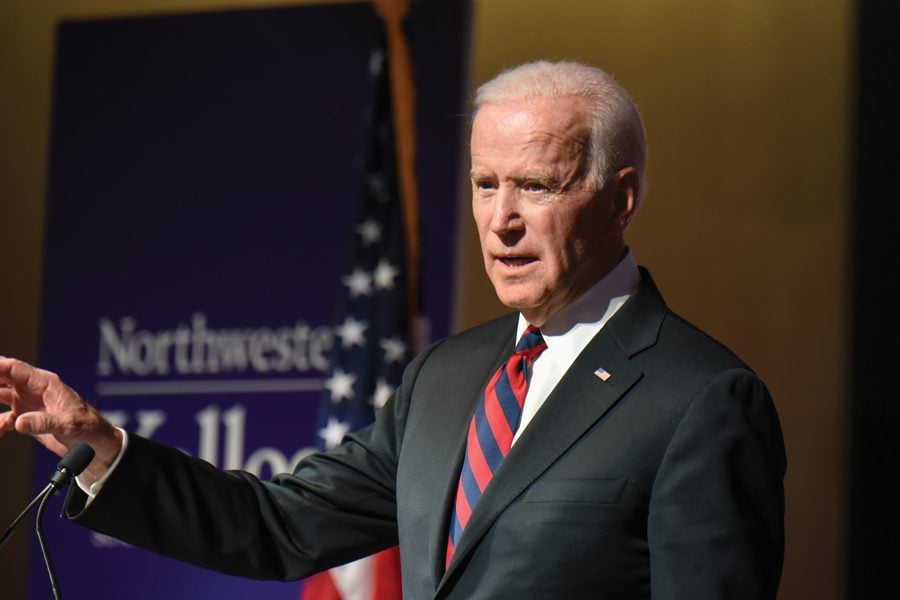Amid heightened prospect of 2020 run, Biden addresses ‘geographic inequity,’ calls for labor rights
Daily file photo by Alan Perez
Joe Biden speaks at the Kellogg Global Hub in 2018. The presidential candidate has expressed support for free college.
March 10, 2018
Economic growth has been driven by Americans’ belief that the nation can achieve anything, but middle-class workers abandoned by economic recovery are starting to wonder about those possibilities, former Vice President Joe Biden said.
Biden championed the middle class and called for policies to address “geographic inequity” during a Friday speech at the Kellogg Global Hub, which came amid a greater push by Democrats to focus on the interests of American middle-class workers, who many credit for the party’s loss in 2016.
Cities like San Francisco and New York have attracted some of the best talent the nation has to offer, leading to innovations that have “changed the world,” Biden said. But other cities and regions, like the Midwest, have not seen the same influx of capital, deepening the economic growth gap that left thousands of workers jobless, he said.
“Jobs are about a lot more than a paycheck,” he said. “It’s about your dignity, it’s about your respect … It’s about being able to look your kid in the eye and say, ‘Honey, it’s going to be OK’ — and mean it.”
Middle America is not just a number, Biden said, but rather a set of values, like respect, dignity and being able to provide for one’s family. Globalization, technological advancement and laws that undercut workers’ rights also “hollowed out” these jobs, he said.
Biden echoed the frustration middle-class Americans took with them to the polls in 2016, often yelling and questioning the dismissal of workers’ concerns as “just (economic) progress.” The speech came hours after Politico reported Biden was seriously considering a 2020 presidential run.
The 44-year public servant touched on other issues, including climate change, immigration, education, health care and the state of American democracy. Biden showed no hesitation when taking aim at the Republican-controlled administration, criticizing the current president’s agenda and negotiation tactics.
Kellogg Dean Sally Blount, who spoke before Biden, said the topic of economic development rings familiar to the Midwestern business school.
“As one of the world’s leading business schools that is not located on a coast, I think we know a little about this,” she said. “We’re very proud to be in America’s heartland, in the middle of many, many different types of cities and towns, and to be part of the economic development engine for the middle of our country.”
Before beginning his formal speech, Biden recognized that Blount was the first woman to head a top business school. He stressed the importance of women’s unrestricted participation in the workforce and their engagement in the political process.
A majority of women voted for Hillary Clinton in 2016, seemingly not buying into Donald Trump’s promise to revitalize Middle America. Biden said the president’s agenda, along with that of his Republican colleagues in Congress, is not a suitable solution for the nation’s inequitable economy.
Instead of trade wars, tax cuts that deepen the deficit and a flawed infrastructure plan, Biden called for policies that encourage innovation, provide some form of free education and expand workers’ rights.
Expanding labor rights such as outlawing noncompete agreements and easing cross-state transfers of occupational licenses will revive the competitiveness of struggling regions, he said.
“In case you haven’t noticed, the right to work is the right not to get a good job,” he said. “I know that’s not popular to say at a business school, but dammit it’s about time you face up to some of these things.”
The speech came on the same day the Department of Labor released its monthly jobs report, which said the U.S. added about 313,000 jobs in February. The continued job growth amid a constant unemployment rate suggests more workers are joining the labor force, potentially the same workers Biden discussed who were discouraged by the previous lack of economic opportunity.
Though Biden made no reference to the report, he said the disparities in regional growth have widened for at least 40 years and called for a recognition that investors and business elites are not the only “engines” to economic growth. The solutions, he added, are neither impossible nor costly.
“Folks … this is the United States of America, there isn’t a damn thing we can’t do,” he said, pounding his fist on the podium before walking off stage.
Brian Griffith, a first-year Kellogg graduate student, said he enjoyed Biden’s focus on “empowering the worker.” He said he agrees that “income and the benefits of the economy have accrued to a smaller group of folks,” and that the solutions laid out to alleviate that inequality “sounded very practical.”
“It didn’t seem like they were huge budgetary items,” he said. “At least with the wave (of) politically playing into the masses (and) trying to get a fair share, it could be more politically possible the next couple years than it has been historically.”
Email: aperez@u.northwestern.edu
Twitter: @_perezalan_



